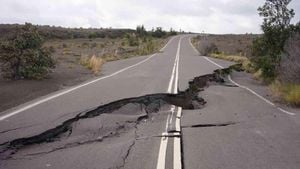Emma Raducanu, renowned for her historic US Open win, has openly acknowledged the challenges she faced post-victory, especially the distractions of off-court commitments. The 22-year-old tennis star, who previously ranked among the top-10 highest-earning female athletes worldwide, found her newfound fame brought more than just accolades; it demanded her time and energy, often at the expense of her performance on the court.
Since her unprecedented triumph as the first player to navigate qualifying rounds to win the US Open, Raducanu’s career has been marked by commercial success yet coupled with significant demands from various sponsors. Brands such as British Airways, Dior, and Vodafone eagerly sought her as their ambassador, leading to extensive commitments outside of training and competition. These engagements often presented scheduling challenges for Raducanu, who remarked, "I was always working really hard, but I just think I wasn’t prepared as well for the other things..." (Emma Raducanu).
Reflecting on this turbulent period, Raducanu has conveyed appreciation for the opportunities afforded to her, stating, "I’m obviously very grateful and fortunate to have had certain experiences..." Nevertheless, she recognized the need for balance. Her time management strategies have since evolved, ensuring she prioritizes her training and matches over commercial obligations. She expressed, "I think now I’m a lot more structured..." indicating her focus on productivity and health.
With aspirations for greater consistency on the circuit, Raducanu has reassessed her coaching dynamics. Having transitioned back to working with former mentor Nick Cavaday, she has solidified her coaching strategy with the additional guidance of fitness trainer Yutaka Nakamura. Nakamura, who has previously collaborated with tennis giants Maria Sharapova and Naomi Osaka, is expected to bolster Raducanu’s physical conditioning on the road. "I want to play more than I did this year..." she stated, hinting at her desire to compete frequently and maintain her fitness throughout tournaments.
Raducanu’s commitment to her health and fitness was not merely based on aspirations of winning, but also on her enthusiasm for the game. After enduring significant injuries, which included surgeries on both wrists and her left ankle, her time away from the court prompted deep self-reflection. She remarked, "That final foot injury just had me like: ‘I really want to stay healthy next year..." leading to her decision to hire Nakamura.
Throughout her career, media scrutiny has accompanied Raducanu’s success. Acknowledging the pressures of her public profile, she stated, “It’s a relationship we’re building,” pointing to her efforts to navigate her connection with the press alongside her growing responsibilities as both athlete and brand ambassador. By saying “no” more often, she aims to control her schedule and dedicate time exclusively for tennis and training.
This shift is not just reactive; it embodies Raducanu’s evolution as both player and person. “I really want to see how good I can be,” she asserted, expressing excitement about exploring her limits on the court. She anticipates her next competition season, with the ASB Classic starting December 30 being her kick-off. “I can do it pretty much every day, like microdoses,” she mentioned, referring to her physical training regimen.
Raducanu's candid reflections also highlight her internalized ambition to maximize her potential rather than chasing immediate accolades. “When I first started... my main reason was: ‘I want to win a Grand Slam’,” she originally stated her driving goal. Now, she seems to embrace the process itself, explaining, "It’s literally just about playing it like a game, seeing how far I can go.”
What does the future hold for this remarkable athlete? Time will reveal how she balances her commitments, but with her renewed focus and structured approach, Raducanu is poised to make greater strides as she dives back onto the court, eager to demonstrate her tenacity and love for the game.



